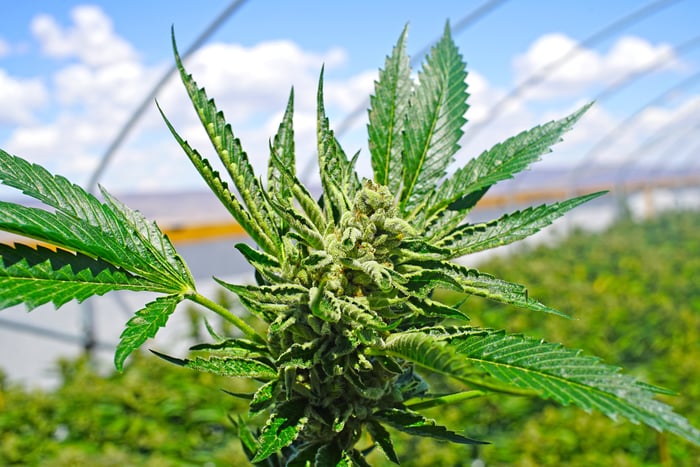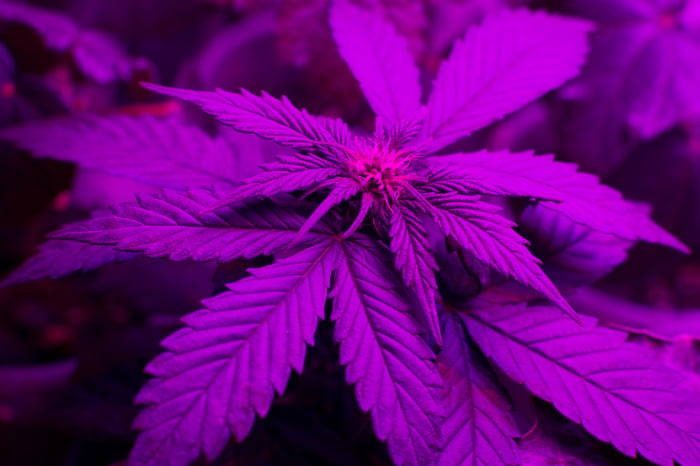Few industries have investors seeing green like the legal marijuana industry at the moment. According to "Marijuana Business Factbook 2017," a report released by Marijuana Business Daily earlier this year, legal U.S. cannabis sales are expected to grow by 30% in 2017, 45% next year, and an aggregate of 300% between 2016 and 2021 to approximately $17 billion. Finding that sort of consistent growth isn't easy, which is why investment dollars have flocked to the space.
But we may just be seeing the tip of the iceberg in terms of what the pot industry is capable of. Cannabis research firm ArcView estimates that more than $46 billion in North American weed sales remain on the black market, while surveys from Gallup and CBS News find that a record percentage of Americans want to see pot legalized nationally. In other words, the table is set for expansion.

Image source: Getty Images.
Three brand-name companies that could soon be seeing green
Within the U.S., eight states have green-lighted recreational weed since November 2012. Meanwhile, Mexico legalized medical cannabis in June, and Canada is working on legislation that could make recreational marijuana legal throughout the country by July, 1, 2018.
Marijuana growers and retailers are obvious beneficiaries of this expansion, but they're far from the only companies that'll be seeing green if this expansion continues. There are, in fact, three brand-name companies not involved in the marijuana industry that could see a notable boost in sales, and perhaps even profits, if the pot industry keeps expanding.
McDonald's
Though it's a pretty well-known fact, one of the most common side effects of cannabis use is "the munchies." Pot users with an appetite need to eat, and according to a recently released analysis from Green Market Report and Consumer Research Around Cannabis, no fast-casual restaurant has been attracting marijuana users more than McDonald's (MCD 0.11%).
The survey, which included approximately 27,500 online respondents, found that 43.4% had visited a McDonald's within the past four weeks. The next-closest fast-casual establishment was Yum! Brands' Taco Bell at 18.3%. That's not even in the same ballpark.

Image source: McDonald's.
The key reason McDonald's has successfully attracted so many weed users is its strength in numbers. As of June 30, 2017, McDonald's had more than 37,000 locations, with close to 40% of those locations within the confines of the United States. It also has close to 1,500 in Canada, which would come in handy if our neighbors to the north move forward with their recreational legalization effort. Comparatively, Taco Bell has closer to 7,000 restaurants worldwide. There's simply more opportunity for McDonald's to use its well-recognized brand to capture eyeballs, and it appears to be working with marijuana users.
At the moment, it's unclear if the company has seen any notable sales improvements in markets such as Colorado, Oregon, and Washington, where recreational weed is legal. But as the recreational market expands in California in 2018, and presumably other states in the years to come, those results should be more pronounced.
Cree
Sure, Cree (WOLF -1.49%) isn't of the same caliber in terms of brand recognition as McDonald's, but when it comes to LED lights and lighting system, it's a dominant player.
At the moment, most cannabis grow farms prefer to use high-pressure sodium (HPS) lights, which have traditionally yielded the best crops. Unfortunately, HPS lights come with two major drawbacks. First, they generate a lot of heat, which means running potentially expensive air-conditioning and climate-control systems. Second, and building off the first point, the electrical needs to run HPS lights are massive, resulting in high electric bills and sizable strains on electrical grids.

Image source: Getty Images.
That's where Cree comes in. The manufacturer of LED lights and lighting systems offers commercial and small-scale growers a way to lower their long-term costs. LED lights produce far less heat than HPS lights, meaning less in the way of climate-control costs, and they use much less electricity. The downside here is that LED lights cost a lot more up front than HPS lights, and there's not a firm consensus on whether crop yields suffer with LED lights when compared to HPS.
Nevertheless, as the marijuana industry expands and the strain on electric grids increases, we should see more growers willing to give LED's a try. That could bode exceptionally well for Cree.
Tesla
Another brand-name business that seems to be getting its fingers in a host of industries is Tesla (TSLA -3.08%). While you know Tesla best as a major disruptor in the auto industry with its lineup of electric vehicles, the company is also making waves as a disruptor in the energy industry, with lithium ion batteries and solar installations. That's where Tesla may be able to get its foot in the door when it comes to legal marijuana.
As noted, electricity demand for growing cannabis is really high. The solution could be a Tesla battery, which would allow cannabis grow farms an opportunity to store energy in the event of a blackout -- marijuana crops struggle after 72 hours without light -- as well as purchase and store energy during off-peak hours. Assuming cannabis grow farms aren't on a fixed-rate charge with their electric company, they could shave off electric costs by purchasing and storing electricity during favorable periods.

Image source: Tesla.
However, most grow farms aren't able to take advantage of these savings as of yet. A 10kWh battery currently runs around $3,500, and grow farms are mostly saving just pennies, or fractions of a penny, on the dollar by purchasing and storing non-peak electricity. As more states legalize, and grow farms become larger and more efficient, it's quite possible we could see Tesla's batteries return sizable cost savings even at fractions of a penny.
There's no doubt in my mind that if the legal-weed business survives for the long term, it's going to need to address the strain it puts on electric grids. Tesla's energy solutions could go a long way toward solving that issue.





